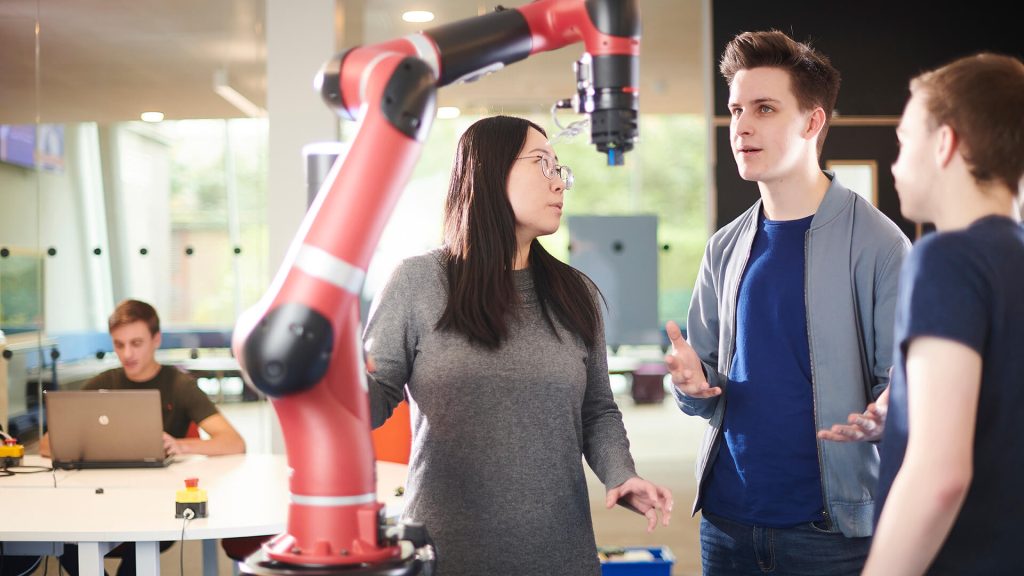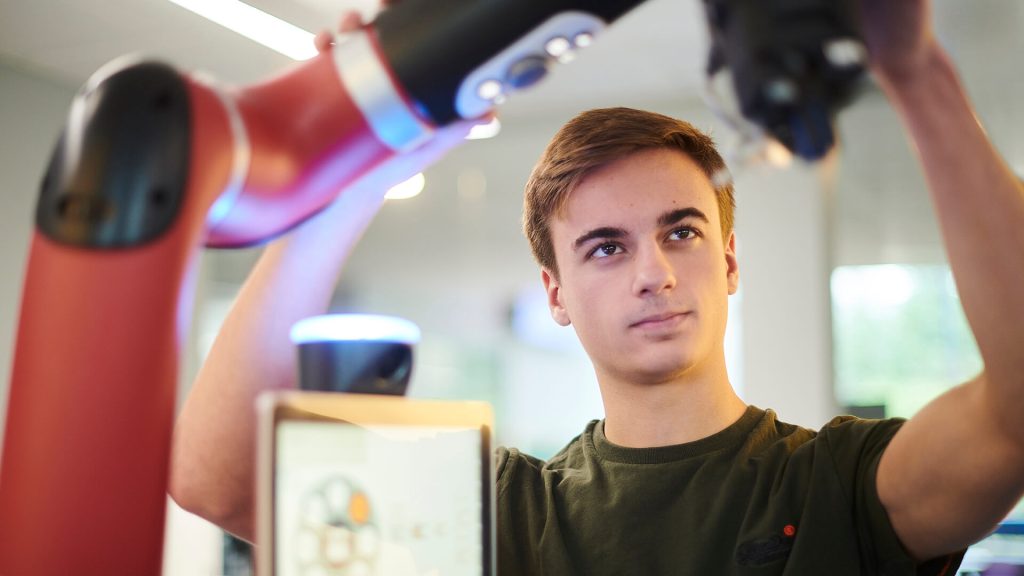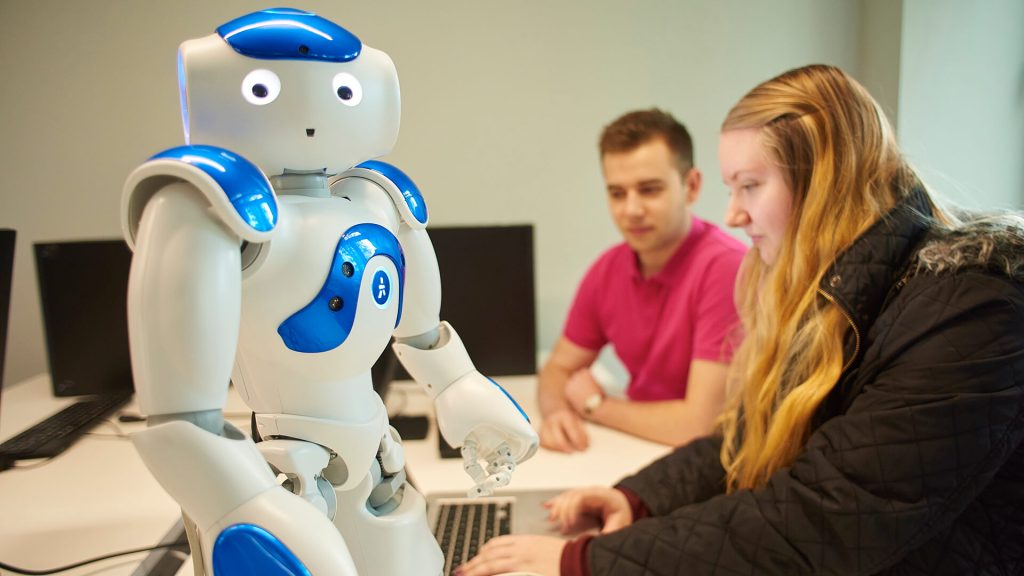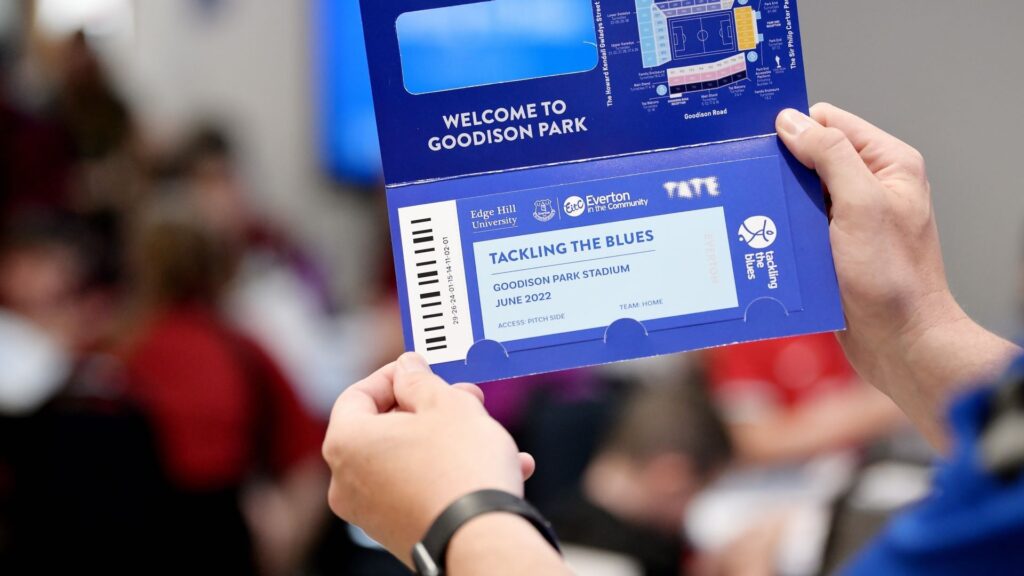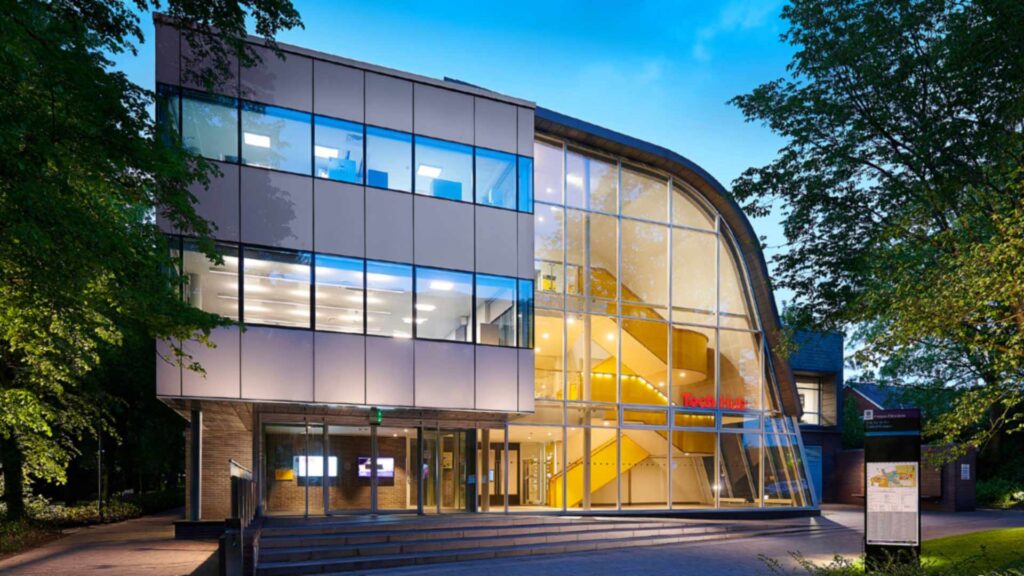Computer Engineering BSc (Hons)
UCAS code: G600
Robotics, artificial intelligence, automation – set technology to work for society with the skills you’ll master on this degree. With a thorough understanding of computer engineering from microprocessors to operating systems, you’ll learn to build the complex tools our world needs.
Overview
| Course length: | 3 years full-time Typically 4.5 years part-time |
|---|---|
| Start dates: | September 2024 September 2025 |
| Location: | Edge Hill University |
| Example offers: | BBC-BBB (A Level) or DMM (BTEC) View full entry criteria |
| Subject(s): | Computing, IT and Mathematics |
| Faculty: | Arts and Sciences |
| Department: | Computer Science |
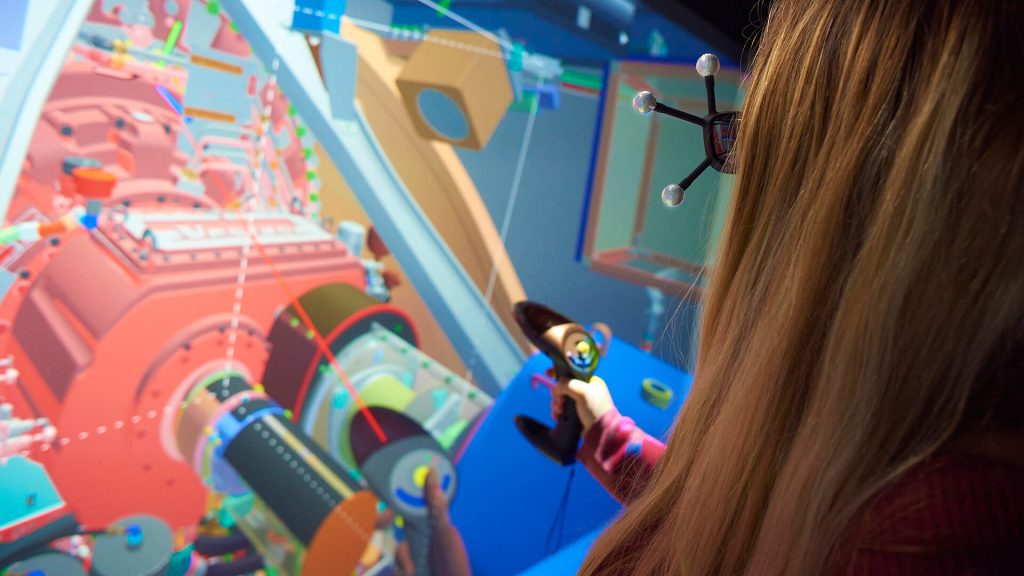
Do you love knowing what makes things tick? Do you like to see the big picture? Then you’re going to enjoy designing and building the systems of the future on our computer engineering degree.
Our labs and workspaces offer state-of-the-art tools for digital technology, so you can work at the forefront of this fast-moving field. You’ll explore modern computer systems and programming, challenge yourself with robotics, and learn how artificial intelligence, virtual reality and sensor systems work.
Hone the skills you need to develop, design, and manage industrial projects. Get hands-on with computer-aided engineering and applied industrial automation. Build sensing systems and master the latest in embedded systems.
Many specialities come together in our BSc (Hons) Computer Engineering. You’ll study how things work from computer architecture to operating systems and sensors, to industrial sensing systems and applications. As a graduate, you will be a skilled professional with the systems-level design expertise sought after by a huge range of industries.
Course features
-
International students can apply
-
Sandwich year option available
-
Studying abroad option available
-
Work placement opportunity
What you'll study
Your computer engineering degree begins with the fundamentals you’ll need for your degree. Grasp key computer science and computer engineering mathematical principles. Develop essential analytical skills. Explore the bedrock of engineering and system construction. Set yourself up with a solid foundation in current computing topics ready for Year 2 and beyond.
Start to specialise in Year 2. You’ll explore control and instrumentation engineering and developing advanced programming skills. Tackle robotics, artificial intelligence and industrial automation and hone your teamwork skills on a group project. After Year 2, take an optional year abroad or a 12-month industry placement to put your new knowledge into practice.
Year 3 sees you develop your practical expertise ready for graduation. Develop a deep understanding of how embedded systems underpin our advanced technology today. Learn to design and build a system using microcontrollers, microprocessors and sensors. You’ll become an independent engineering researcher and use your skills to create your own sensing system or software tool.
How you'll study
Teaching methods are designed in consultation with leading employers in the region. Many classes are based in computing laboratories, focusing on student activity as a means of learning. We introduce theoretical concepts by building on concrete practical activity.
Classes are highly interactive, with practical application of concepts a key factor, as well as cases drawn from real-life. Workshops, seminars, group tutorials and practical exercises provide opportunities for you to work with your peers and develop the essential people skills to complement your technical ability.
Studying on a full-time basis, you will be required to attend classes for up to four days a week.
How you'll be assessed
You will be assessed through a combination of practical exercises, coursework, portfolios, reports, essays, presentations, and examinations. We want you to develop the ability to work effectively both independently and as part of a team, therefore assessment includes some small group activities, though the emphasis is strongly on individual work.
Who will be teaching you
You will be taught by academic staff who are highly qualified, experienced and enthusiastic leaders in their fields.
The Department of Computer Science provides a research-active environment where the programme team contribute to academic conferences and journals, regularly engage within the wider business and academic environment, and feed research directly into their teaching. You will learn about the latest developments in subjects while gaining the knowledge and skills to meet the demands of the IT industry.
Guest lectures also form part of the programme. These will be delivered by industry experts and academics from other disciplines to equip you with a wide range of knowledge, experiences and different perspectives.
Entry criteria
Entry requirements
Typical offer 112-120 UCAS Tariff points, for which no specific subjects are required, plus GCSE Mathematics at Grade C or Grade 4 or above (or equivalent).
Please note, for all programmes in the Department of Computer Science, a level 2 numeracy qualification is not considered as equivalent to GCSE Grade C or Grade 4 in Mathematics.
Example offers
| Qualification | Requirement |
|---|---|
| A Level | BBC-BBB. |
| BTEC Extended Diploma (or combination of BTEC QCF qualifications) | Distinction, Merit, Merit (DMM). |
| T Level | Overall grade of Merit. |
| International Baccalaureate (IB) | We are happy to accept IB qualifications which achieve the required number of UCAS Tariff points. |
| Access to Higher Education Diploma | 45 credits at Level 3, for example 15 credits at Distinction and 30 credits at Merit or 24 credits at Distinction and 21 credits at Merit. The required total can be attained from various credit combinations. |
Please note, the above examples may differ from actual offers made. A combination of A Level and BTEC awards may also be accepted.
If you have a minimum of two A Levels (or equivalent), there is no maximum number of qualifications that we will accept UCAS points from. This includes additional qualifications such as Extended Project Qualification (EPQ), AS Levels that haven't been continued to A Level, and General Studies AS or A Level awards.
English language requirements
International students require IELTS 6.0, with a score no lower than 5.5 in each individual component, or an equivalent English language qualification.
If your current level of English is half a band, one band, or one-and-a-half bands lower, either overall or in one or two elements, you may want to consider our Pre-Sessional English course.
How to apply
Apply full-time
Read our guide to applying through UCAS to find out more about the application process.
International
Please see our international student pages for further information about how to apply as a prospective international student.
Part-time applications require a direct application to Edge Hill. Please select the year of entry that you wish to apply for.
Should you accept an offer of a place to study with us and formally enrol as a student, you will be subject to the provisions of the regulations, rules, codes, conditions and policies which apply to our students. These are available at www.edgehill.ac.uk/studentterms.
If you join a full time undergraduate degree at Edge Hill University, we will guarantee you the offer of a room in our halls of residence for the first year of your course.
Discover our accommodation
Facilities
 The Department of Computer Science is based in the state-of-the-art £13million Tech Hub. This purpose-built development offers highly contemporary suites of outstanding facilities for Computer Science and Engineering students. Our modern computing and engineering laboratories are equipped with comprehensive test and measurement equipment, high-specification computers, high-resolution screens and the latest hardware and software.
The Department of Computer Science is based in the state-of-the-art £13million Tech Hub. This purpose-built development offers highly contemporary suites of outstanding facilities for Computer Science and Engineering students. Our modern computing and engineering laboratories are equipped with comprehensive test and measurement equipment, high-specification computers, high-resolution screens and the latest hardware and software.
A four-screen CAVE (Computer Augmented Virtual Environment) provides a super immersive 3D virtual environment, enabling users to immerse themselves in a virtual room and experience real life scenarios in 4K resolution. There are also specialist laboratories for networking and games programming, in addition to a specialist research laboratory, open access laboratory and a Harvard style lecture theatre.
Where you'll study
Tech Hub
Learning resources
Learning resources include robots and a robotics simulator, wired and wireless networking hardware, graphics software, web development tools, software development environments, big data servers, eye trackers, giant 3D interactive teaching screens, and other specialist software required for studying forensics and internet security techniques.
Finance
Tuition fees
UK Full-Time
£9,250
a year
UK Part-Time
£77 per credit
for 360 credits
International
£16,500
a year
EU/EEA and Swiss students who have settled or pre-settled status under the EU Settlement Scheme, as well as Irish nationals, may be eligible for the UK tuition fee rate.
Financial support
Subject to eligibility, UK students joining this course can apply for a Tuition Fee Loan from the Government to cover the full cost of tuition fees. UK students enrolling on the course may also be eligible to apply for additional maintenance loan funding to help with living costs. Please view the relevant Money Matters guide for comprehensive information about the financial support available to eligible UK students, together with details of how to apply for potential funding.
EU/EEA and Swiss students who have settled or pre-settled status under the EU Settlement Scheme may be eligible to apply for financial support. Irish nationals can ordinarily apply to Student Universal Support Ireland (SUSI). If you are an EU student who does not have settled or pre-settled status, or are an international student from a non-EU country, please see our international student finance pages.
Your future career
You’ll leave us with the skills and knowledge to launch your career in computing. Jobs you could apply for include embedded software engineer, network engineer, technical systems engineer, and hardware engineer.
Our computer engineering graduates are ready to work in many different industries, such as:
- automotive
- aerospace
- finance
- petrochemical
- biomedical
- manufacturing
- energy
If you prefer to pursue an academic path, you can apply for a range of computing Masters degree as the next step on a route to a PhD.
Course changes
Every effort has been made to ensure the accuracy of this information, however our courses are subject to ongoing review and development. Changing circumstances may necessitate alteration to, or the cancellation of, courses.
Changes may be necessary to comply with the requirements of professional bodies, revisions to subject benchmarks statements, to keep courses updated and contemporary, or as a result of student feedback. We reserve the right to make variations if we consider such action to be necessary or in the best interests of students.
